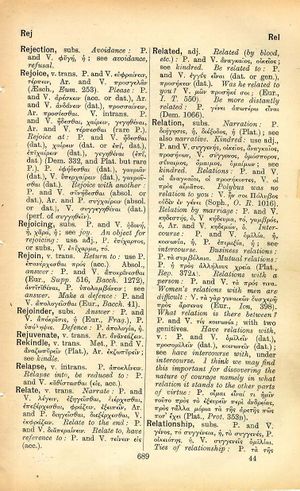relation: Difference between revisions
τὸν αὐτὸν ἔρανον ἀποδοῦναι → pay him back in his own coin, repay him in his own coin, pay someone back in their own coin, pay back in someone's own coin, give tit for tat, pay back in kind
(Woodhouse 4) |
(CSV4) |
||
| Line 1: | Line 1: | ||
{{ | {{Woodhouse1 | ||
| | |Text=[[File:woodhouse_689.jpg|thumb|link={{filepath:woodhouse_689.jpg}}]]'''subs.''' | ||
<b class="b2">Narration</b>: P. [[διήγησις]], ἡ, [[διέξοδος]], ἡ (Plat.); see also [[narrative]]. | |||
<b class="b2">Kindred</b>: use adj., P. and V. [[συγγενής]], [[οἰκεῖος]], [[ἀναγκαῖος]], προσήκων, V. [[σύγγονος]], [[ὁμόσπορος]], [[σύναιμος]], [[ὅμαιμος]], [[ὁμαίμων]]; see [[kindred]]. | |||
<b class="b2">Relations</b>: P. and V. οἱ ἀναγκαῖοι, οἱ προσήκοντες, V. οἱ πρὸς αἵματος. | |||
<b class="b2">Polybus was no relation to you</b>: V. ἦν σοι Πόλυβος οὐδὲν ἐν γένει (Soph., ''O.R.'' 1016). | |||
<b class="b2">Relation by marriage</b>: P. and V. [[κηδεστής]], ὁ, <b class="b2">V</b> [[κήδευμα]], τό, [[γαμβρός]], ὁ, Ar. and V. [[κηδεμών]], ὁ. | |||
<b class="b2">Intercourse</b>: P. and V. [[ὁμιλία]], ἡ, [[κοινωνία]], ἡ, P. [[ἐπιμιξία]], ἡ; see [[intercourse]]. | |||
<b class="b2">Business relations</b>: P. τὰ συμβόλαια. | |||
<b class="b2">Mutual relations: P</b>, ἡ πρὸς ἀλλήλους [[χρεία]] (Plat., ''Rep.'' 372A). | |||
<b class="b2">Relations with a person</b>: P. and V. τὰ [[πρός]] τινα. | |||
<b class="b2">Women's relations with men are difficult</b>: V. τὰ γὰρ γυναικῶν δυσχερῆ πρὸς ἄρσενας (Eur., <b class="b2">Ion</b>, 398). <b class="b2">What relation is there between?</b> P. and V. τίς [[κοινωνία]]; with two genitives. | |||
<b class="b2">Have relations with</b>, v.: P. and V. ὁμιλεῖν (dat.), προσομιλεῖν (dat.), κοινωνεῖν (dat.); see <b class="b2">have intercourse with</b>, under [[intercourse]]. | |||
<b class="b2">I think we may find this important for discovering the nature of courage namely in what relation it stands to the other parts of virtue</b>: P. [[οἶμαι]] εἶναί τι ἡμῖν τοῦτο πρὸς τὸ ἐξευρεῖν περὶ ἀνδρείας, πρὸς τἄλλα μόρια τὰ τῆς ἀρετῆς πῶς ποτʼ ἔχει (Plat., ''Prot.'' 353B). | |||
}} | }} | ||
Revision as of 09:50, 21 July 2017
English > Greek (Woodhouse)
subs.
Narration: P. διήγησις, ἡ, διέξοδος, ἡ (Plat.); see also narrative. Kindred: use adj., P. and V. συγγενής, οἰκεῖος, ἀναγκαῖος, προσήκων, V. σύγγονος, ὁμόσπορος, σύναιμος, ὅμαιμος, ὁμαίμων; see kindred. Relations: P. and V. οἱ ἀναγκαῖοι, οἱ προσήκοντες, V. οἱ πρὸς αἵματος. Polybus was no relation to you: V. ἦν σοι Πόλυβος οὐδὲν ἐν γένει (Soph., O.R. 1016). Relation by marriage: P. and V. κηδεστής, ὁ, V κήδευμα, τό, γαμβρός, ὁ, Ar. and V. κηδεμών, ὁ. Intercourse: P. and V. ὁμιλία, ἡ, κοινωνία, ἡ, P. ἐπιμιξία, ἡ; see intercourse. Business relations: P. τὰ συμβόλαια. Mutual relations: P, ἡ πρὸς ἀλλήλους χρεία (Plat., Rep. 372A). Relations with a person: P. and V. τὰ πρός τινα. Women's relations with men are difficult: V. τὰ γὰρ γυναικῶν δυσχερῆ πρὸς ἄρσενας (Eur., Ion, 398). What relation is there between? P. and V. τίς κοινωνία; with two genitives. Have relations with, v.: P. and V. ὁμιλεῖν (dat.), προσομιλεῖν (dat.), κοινωνεῖν (dat.); see have intercourse with, under intercourse. I think we may find this important for discovering the nature of courage namely in what relation it stands to the other parts of virtue: P. οἶμαι εἶναί τι ἡμῖν τοῦτο πρὸς τὸ ἐξευρεῖν περὶ ἀνδρείας, πρὸς τἄλλα μόρια τὰ τῆς ἀρετῆς πῶς ποτʼ ἔχει (Plat., Prot. 353B).

